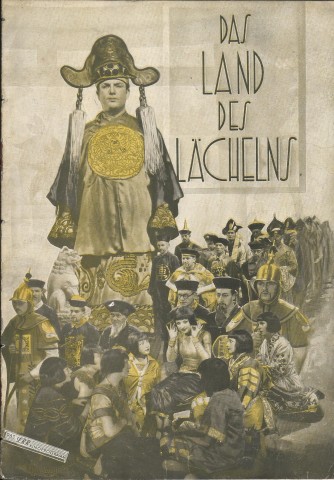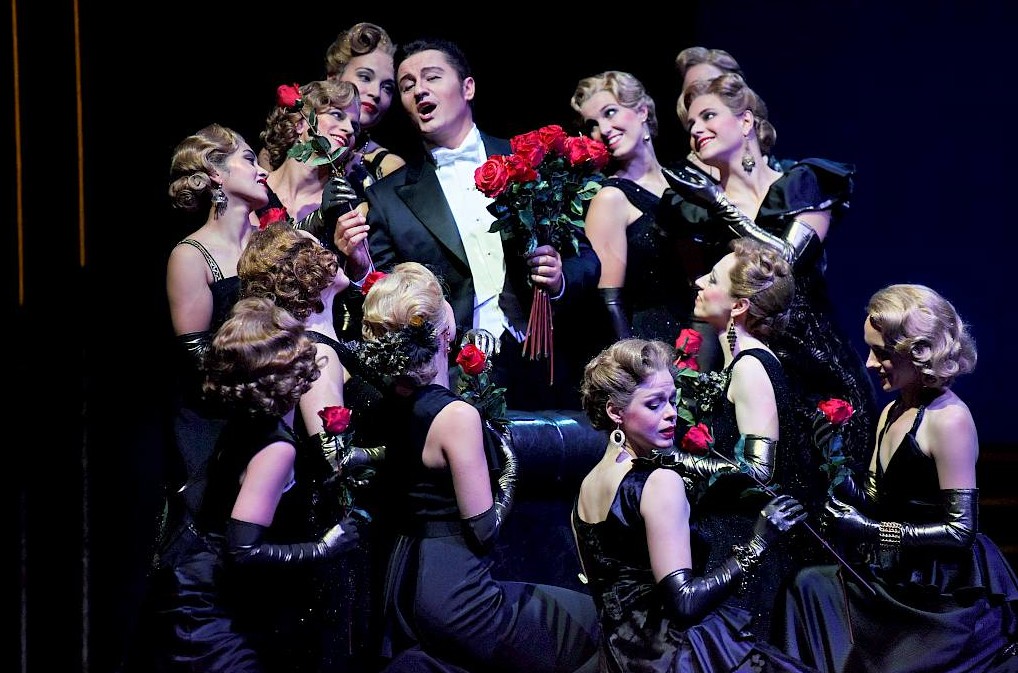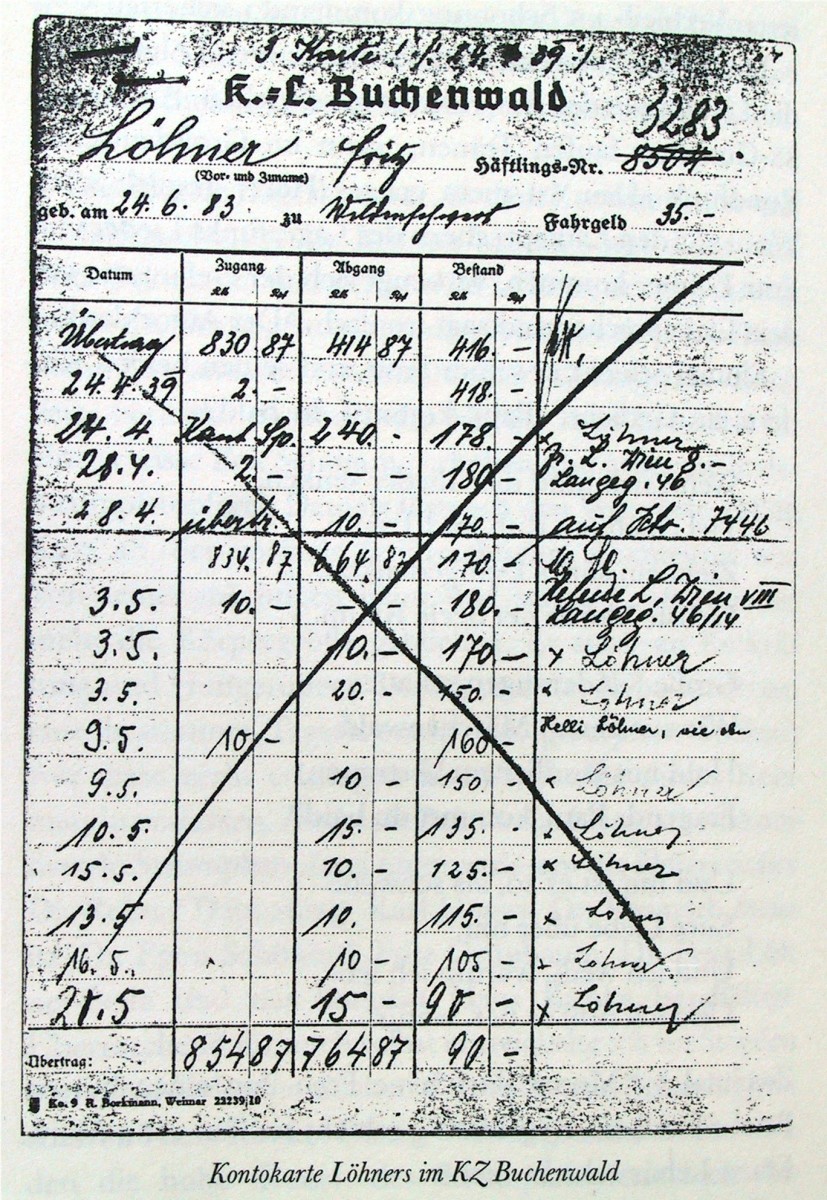Kevin Clarke
Operetta Research Center
25 August, 2020
Here’s the curious case of Dona D. Vaughn and the state of operetta in 2020. As artistic director of opera at Manhattan School of Music (MSM) Miss Vaughn got fired for putting on Lehar’s Das Land des Lächelns (1929). Actually, she got “cancelled” via an online petition that stated: “We are requesting the immediate removal of Dona D. Vaughn from the faculty at MSM. Ms. Vaughn not only produced an extremely racist and insensitive opera but also chose to cast the only black student as the butler in this production.” The aim of the petition was to “take action now”: “Now is the time to make MSM a safe institution for all of our young artists!”

Richard Tauber seen in Chinese costume as Prince Sou-Chong in the film version of “Land des Lächelns.”
A little later someone at change.org announced that Miss Vaughn had indeed been removed from her position. “Victory,” claimed Amy Kuckelman and thanked everyone who supported the petition: “The work is never over and I hope you feel strengthened by this victory,” writes Kuckelman.
You might wonder what exactly went on, what “work” wasn’t over, and who is now “strengthened” by this affair?
The whole thing went viral via an online Q&A in which Miss Vaughn discussed the Lehár show with her students. One of them asked how an arts organization “with a social conscience” such as MSM could “resurrect” a work that “plays into racial stereotypes” and “portrays Asians as one-dimensional caricatures.”
Instead of answering this and explaining “her stand” – and also discussing the fact that a Tauber role such as Prince Sou-Chong is anything but one-dimensional – Miss Vaughn says the fatal words: “Just cut him off!” Claiming that this was “a political statement” rather than a question. And she repeats the words “cut him off,” triggering all that followed.
You cannot help but wonder if Miss Vaughn’s cancellation as artistic director was solely due to “cutting off” a student in an online Q&A? Or for putting on Land des Lächelns in the first place? Or for not being willing to enter into a political debate with regard to operetta?

Chinese lanterns are just one of many stereotypes used in “Land des Lächelns” to create “atmosphere.” (Photo: Carl Ibale / Unsplash)
Wouldn’t this Lehár show be the perfect opportunity to discuss with woke students of today how ethnic and racial stereotypes have changed over the decades, what they meant back in 1929 and what they mean in 2020? But also ask how a director could deal with such issues intelligently today – instead of cancelling the entire work and shoving it into the closet, never to talk about it again (or play the music again).
And if the students are so anxious about fair treatment: does it matter to them that a senior staff member is now out of a job? No debate, just an online petition, and wham? Is it typical power play, and never mind who gets hurt along the way?
From the claim that Land des Lächelns is an “extremely racist and insensitive opera” you might already deduct that these activist students didn’t spend too much time and energy on examining the Lehar show? Or maybe ask why the Jewish author Fritz Löhner-Beda might have been attracted to a story of “outsiders” in society who are, ultimately, crippled by traditions and social expectations. In both directions, i.e. the Austrian countess Lisa cannot adapt to the ways expected of her as a wife in China, and the Chinese prince suffers from the stereotypes projected onto him as an Asian man by the Europeans (he even sings about it, multiple times). On the other hand, he is unwilling or unable to change traditions about the role of women in China when he sees that it hurts his wife Lisa who has followed him across the world for love, overcoming all racist prejudice she encountered back home in act 1. And how is the comedy duo playing (you might say: deconstructing) racial stereotypes in contrast to Lisa and her prince? What about Chinese princess Mi being a smart modern woman who plays tennis in modern dress and refuses to accept traditional gender roles in China? What about her love interest Gustl-from-Austria who is also forced to re-think his ideas of a woman’s position in his life?

DVD of “Land des Lächelns” starring Rene Kollo and Dagmar Koller. (Photo: Deutsche Grammophon)
Surely, there would be a lot to delve into for any student – and maybe also ask what China’s role as aggressor and conqueror was back then, or later? Or check how the Chinese saw and see the Europeans, in caricature, film, musical theater? Would it be possible to show both sides of the narrative? And are you allowed to present all of this with humor and typical operetta farcicalness? Or is that per se “racist”?
It seems these debates are only just starting, and they have reached Europe already. Not too long ago a German critic claimed that Land des Lächelns was “racist” and suggested, as a solution, that the libretto should be re-written. (What a simple minded answer to a big issue.) When Andreas Homoki put Land des Lächeln on at Opera Zurich he simply reduced the show to a semi-concert staging without much dialogue and without overly obvious “Chinese” elements. (You could also call that a rather simple minded approach.)

Piotr Beczala as Sou Chong and the Zurich chorus girls in “Land des Lächelns.” (Photo: Toni Suter / Oper Zürich)
How would Chinese artists themselves deal with the Lehár/Löhner-Beda show? Or artists with an Asian background outside of Asia? Could we get more perspectives on this, more opinions, more suggestions for solutions, including stagings that directly address all of this? New books, new essays, new conferences? And how does all of this apply to other shows, let’s say to The Mikado or The Geisha? And what happens when People of Color do “Yellow Face” and reproduce “racial stereotypes”?

LP cover of the 1975 “Hot Mikado” from London.
The current Hulu series The Great about Empress Catherine the Great uses ethnic casting and stereotypes in a brilliant way to comment on a historic situation and add a very contemporary perspective to a story we know did not happen like that. A Land des Lächelns production could take its cue from this and see how it works with regard to the operetta’s fantasy Austria and China, with its court settings in Vienna and Beijing.
But it seems the MSM activists are not interested in any of this in their crusade to purge the world of anything they brand as “unwanted” or “irritating” – Dona D. Vaughn seems to have been just another “victorious” casualty along the way, like the various statues that have come toppling down the world over, without starting a multi-layered debate they simply got smashed by the mob. Making the world a “safer” place?
Fritz Löhner-Beda experienced where such mob dynamics can lead to. He was “cancelled” from all playbills in Germany after 1933, and he died in a concentration camp, beaten to death.

The concentration camp registration card of Fritz Löhner-Beda who died in Auschwitz.
Obviously, that’s not quite the same as the current woke activism. But what’s similar is this: the Nazis also sent their troops into theaters in so called “Wilde Maßnahmen” (wild actions) causing so much terror and angst that many people stopped putting on shows or engaging particular artists that they knew would bring on such “actions.” Is that, seriously, what the self appointed social justice warriors of today want to repeat with their cancel culture and Twitter crusades?
We have certainly entered a new level of debate. Considering that until fairly recently operetta as a genre was seen as a world of complete “harmlessness” this might come as a shock for some. Others might see this change as a good reason to leave the familiar “safe space” operetta represented behind and connect the art form which today’s big topics. In their way, the Manhattan School of Music activists have done exactly that. And what they did should not be ignored or silently overlooked – but taken seriously!

Excellent column, excellent, thoughtful suggestions of ways to deal with traditional music-theater — and theater for that matter, though it’s easier to rewrite Shakespeare’s lines than Lehar’s music. (I’ve noticed they bowdlerize the Joan of Arc scenes in Henry VI these days.)
Yes, I am reminded very much of, for example, the rewriting of Handel oratorios in Nazi Germany so that the Jews are not praised or, indeed, mentioned. And the elimination there of operas like Der Templar und die Judin, Marschner’s version by the way of Scott’s Ivanhoe. Indeed everything about this event reminds me of Germany in the 1930s.
And I’m terribly sorry to lose Prof. Vaughn, who has provided me with many delightful evenings at MSM. I suppose, as a Pagan, I might have objected to her production of Offenbach’s satirical “Orphe aux Enfers.” But it honestly didn’t occur to me to do so. I had a wonderful time!
Opera companies and training programs must do everything they can to evolve beyond the structural racism that plagues our industry.
Had MSM publicly committed to a program to promote greater equity and started a anti-racism conversation within their own community, as I wish all our institutions would, I believe that this scenario with Vaugn would never have come to pass. Or had it, the overall outcome would be very different. Our institutions have typically been reactive to embarrassing situations, rather than proactive about improving their culture. Had MSM implemented a program to raise consciousness, they could have convened a discussion about the Lehar that explored all of the angles covered in this article. The discussion could even have been led by Vaughn, who could have explained how her choices might be different now, and there could have been room for opposing points of view, and so on.
Instead, Vaughn and MSM were completely caught off guard by someone who wants to expose the structural racism in our music institutions. Their initial response was tone-deaf and inadequate, because neither Vaughn nor MSM had been doing any soul searching about this aspect of our culture. The tone-deaf response poured gasoline on the fire the activists started, and this was the outcome.
The story here is not about how Vaughn was unfairly targeted and cancelled. The story is that our institutions still aren’t taking the lead on this issue, and so they remain part of the problem rather than part of the solution. It creates a vacuum that activists try to fill. That is why this went down the way it did.
That’s a well considered article that deserves to be widely read. I am appalled by this entire affair. Letting students dictate to administration is like letting the lunatics fun the asylum. We are not painting over the paintings at the Metropolitan Museum of Art, nor should we destroy the history of our culture in other areas. I get enough “current events” an “relevancy” from newspapers and essays. For me, opera is about entertainment and gorgeous music. I have reviewed the operetta in question for my website (vocedimeche.reviews) and found it charming. As a consequence of this kerfuffle, I have terminated my association with change.org and am reconsidering my support of MSM.
MSM’s strategic plan which is public on their website very clearly states their position on equity diversity and inclusion. It began in 2019 so it should have been clear to this teacher that they weren’t going to stand for her cutting off someone who wanted a dialogue on this topic. Shouldn’t educators want to engage in discussion?
There has been a wide misrepresentation of the online class in which Dona Vaughn was teaching when she made her comments. I would like to provide some clarification on the circumstances of the class. This was not an open Q&A. It was a high school masterclass, put on by a Colorado based after school program, on performing musical theatre. This was not an MSM class, nor was it connected to MSM in any way. Students had paid for a 20min time slot to perform and receive critiques from Ms. Vaughn. Auditors were allowed to join the class and there would be an open Q&A at the end, if time allowed, for them to ask questions. At the time of Ms. Vaughn’s comments a student had just finished being critiqued. Ms. Vaughn asked if “There were any questions about what we had just done” and that was when the auditor interrupted with their question. It caught everybody by surprise since it was not on topic and we had 3 more singers to get through. I am not posting this to excuse the response, but I do think that it is worth clarifying the circumstances around which it occurred.
If MSM terminated a faculty luminary over a shocked response to a Zoom-Bombing, followed by her subsequent apology on social media, it is obvious that the school had its own agenda.
Donna Vaughn was on the chopping block already as far as holding her position at MSM. This “call-out” event was unfortunately the last straw and perfect storm for her termination. They were already waiting to fire her.